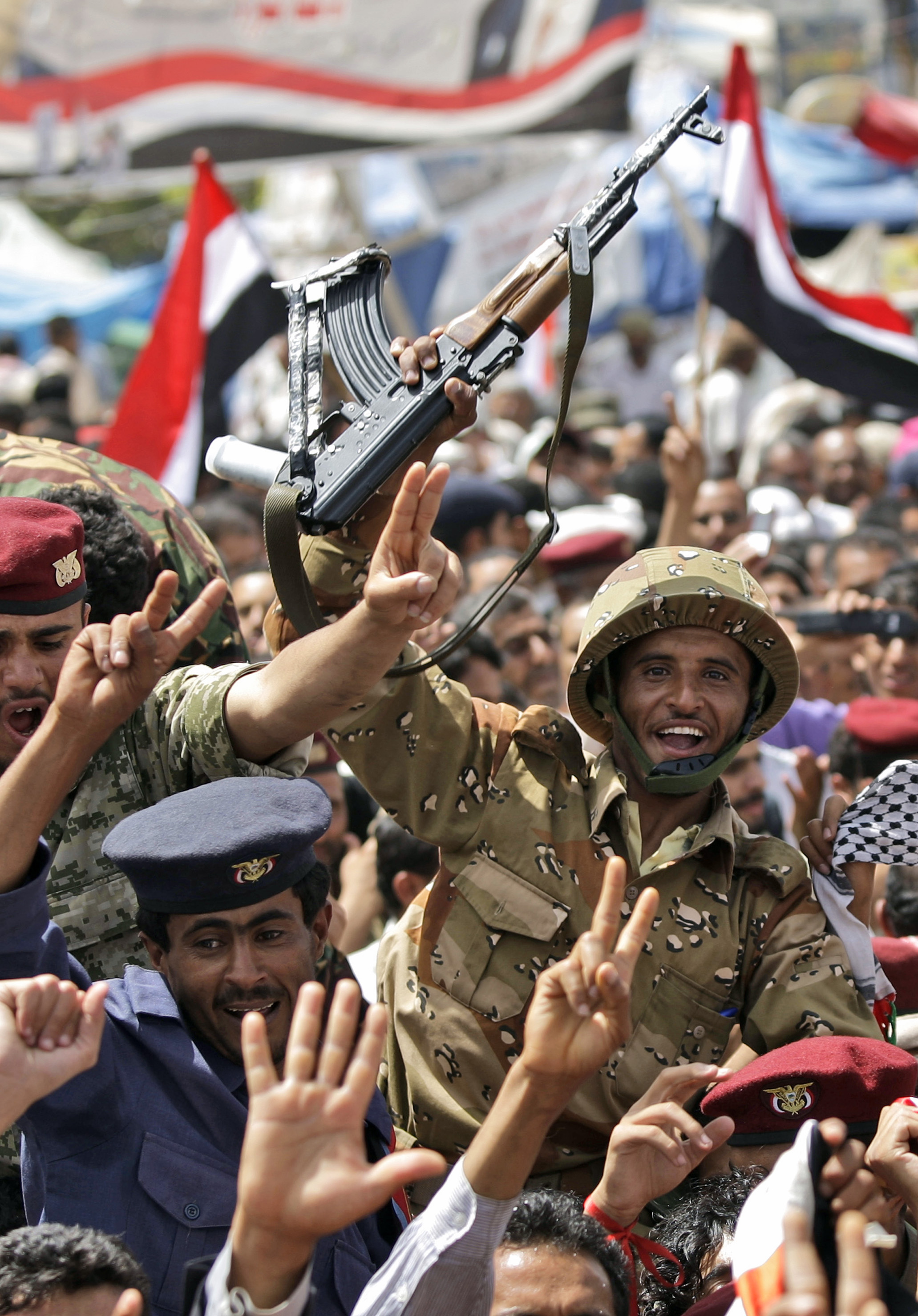 A Yemeni army soldier, center, lifted by anti-government protestors, holds up his rifle as they celebrate President Ali Abdullah Saleh's departure to Saudi Arabia, in Sanaa, Yemen, Sunday, June 5, 2011. Thousands of protesters are dancing and singing in the Yemeni capital Sanaa after the country's authoritarian leader flew to Saudi Arabia to receive medical treatment for wounds he suffered in a rocket attack on his compound. (AP Photo/Hani Mohammed)
A Yemeni army soldier, center, lifted by anti-government protestors, holds up his rifle as they celebrate President Ali Abdullah Saleh's departure to Saudi Arabia, in Sanaa, Yemen, Sunday, June 5, 2011. Thousands of protesters are dancing and singing in the Yemeni capital Sanaa after the country's authoritarian leader flew to Saudi Arabia to receive medical treatment for wounds he suffered in a rocket attack on his compound. (AP Photo/Hani Mohammed)A rocket attack on the presidential palace in Yemen on Saturday accomplished what weeks of violence could not. It ended, for the moment, what appeared to be a bloody stalemate between the forces of Yemeni President Ali Abdullah Saleh and opposition tribal groups determined to end his long-time dictatorship. Saleh, seriously wounded in the attack, was taken to neighboring Saudi Arabia for treatment. His absence provides a chance to broker an arrangement that could help prevent civil war in Yemen. Diplomats seized the chance to do so.
U.S. officials, joined by representatives of Saudi Arabia, other Gulf Arab nations and elements in Yemen, worked feverishly Monday to craft a plan that would allow the transfer of power from Saleh to a new government acceptable to Yemenis. There's tremendous sentiment inside and outside Yemen for such a pact, but there's no certainty it can become fact. Saleh vows to return to his country.
That certainly would bring civil war to a nation that has been on the verge of it for months. The dictator's departure Saturday allowed Saudi Arabian diplomats to broker a truce between Saleh's forces and the opposition. At this writing, the truce was holding, but barely. Sporadic confrontations between pro and anti-government forces Monday reportedly resulted in several deaths.
The United States and Saudi Arabia, particularly, would benefit from any deal that prevents Saleh's return. The former wants to restore at least some stability to the region. It fears that continued unrest will strengthen al-Qaida in the region. The latter wants to end political violence in the region because it rightfully fears it might spread to Saudi Arabia. So far, neither diplomatic nor economic pressure - Saudi Arabia has long provided financial aid to Yemen - has produced results. Saleh remains intransigent.
He refuses to accept a U.S.-approved arrangement that would allow him to retire, that would create a unity government between his supporters and his opponents and that would bring free presidential elections to Yemen. Those are realistic goals - if Saleh can be convinced they are in his interest. The United States, Saudi Arabia and others with vital concerns in the region must convince him that is the case.
They'll have to be careful, though. Neither the United States nor Saudi Arabia wants to push so hard that it leads to open hostilities with a nation that, despite its woes, is still a useful ally to both. And no outside power can afford to be viewed by Yemenis or other Muslim nations as dictating a settlement. The repercussions of doing so in a place where tribal loyalties generally trump any vision of democracy or nationhood could be disastrous.
What's required is circumspect use of diplomacy to bring an entrenched government, tribal leaders and protesters in Yemen to agreement in a limited amount of time. That's a difficult task, but it is the best hope now available to restore a semblance of peace to Yemen.
